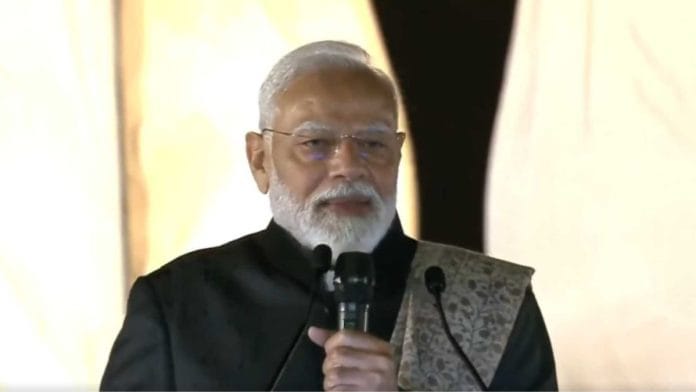This week, while scrolling through my social media feed, between the usual flood of outrage and deafening debates, I came across a video that felt like a breath of fresh air. It was a celebration of pluralistic Sufism, unfolding in all its grace and depth.
For a moment, the usual social media anger and division faded, replaced by the soothing feeling of poetry, music, and a heritage that refuses to be erased. It was comforting, almost grounding, to see an acknowledgment of India’s pluralistic Muslim cultural legacy, a reminder of something larger than mere headlines.
And what made it even more special was the presence of the Prime Minister of India, Narendra Modi, who addressed the 25th edition of Jahan-e-Khusrau in New Delhi. It was an image both significant and complex in the country’s current socio-political scenario.
India’s cultural consciousness
The festival drew Sufi musicians who gathered in tribute to 13th-century poet and mystic Hazrat Amir Khusrau—a figure whose legacy continues to shape the cultural fabric of the subcontinent. Many scholars regard Khusrau, much like Kabir Das, as a father figure of North India’s Ganga-Jamuni syncretic tradition, a living testament to the interwoven threads of faith, language, and artistic expression.
Scholars say it was his deep, unwavering love for his homeland that earned him the prestigious title of Tuti-yi-Hind—the Parrot of India. His voice spoke of devotion, longing, and belonging in a way few others could. And his influence was far more than just sentiment. Khusrau was a literary innovator, blending Persian and Indian traditions to create a distinct Indo-Persian genre, leaving lasting imprints on the subcontinent’s memory. The mystic’s brilliance secured his place not only among the greatest poets of his time but also among those rare figures who transcend history, leaving behind a legacy that still breathes through India’s cultural consciousness today.
Interestingly, PM Modi described the annual music festival honouring Amir Khusrau as carrying the “fragrance of the soil of Hindustan.” He also recalled how Khusrau once compared Hindustan to heaven. The invocation of Khusrau was significant, but so was the context in which these words were spoken.
In a political landscape where Modi’s image has been repeatedly painted as anti-Muslim, every instance where he acknowledges, participates in, or speaks positively about India’s Muslim historical figure sparks both attention and scepticism. There are always some underlying questions: What is the reason behind it? Is it a genuine outreach, a strategic gesture, or something else altogether?
Also read: Hip hop is rising in Delhi’s Nizamuddin. Sufi spirit gets a new swag
Contested narratives
From his speech, it seems that Modi’s message is to position Sufism as a bridge between communities, with Amir Khusrau as its flag bearer—a poet whose legacy embodies the pluralistic essence of the tradition. Remembering Khusrau in this way comes across as symbolic, as it subtly promotes the idea that Sufism is a version of Islam that is more inclusive, rooted in Indian soil, and aligned with the subcontinent’s larger cultural ethos.
By emphasising that Sufi traditions have not only bridged spiritual distances but also fostered connections across nations, Modi seemed to be drawing a parallel between Indic culture and Sufism. He presented Sufism as something inherently belonging to India rather than an imported or foreign construct. Whether strategic or sincere, such a narrative aligns with the idea that Sufism, unlike certain other interpretations of Islam, is more adaptable to India’s civilisational framework and society in general, making it an instrumental tool of interfaith dialogue.
In a time when religious identity is a contested space in India, this messaging carries layers of meaning. It can be seen as an attempt to emphasise common ground over divisions. Yet it also raises questions: Can Sufism really be all that? Can it truly serve as the bridge between communities, the embodiment of pluralism, and the acceptable face of faith within a national framework? The celebration of Sufism, then, is not just about culture and history, but also about shaping contemporary narratives of belonging and identity.
However, the irony remains that both extremes—Modi’s staunchest critics and his most unwavering supporters—find themselves uneasy with such moments. For one side, it presents a contradiction too glaring to reconcile, as nothing about Indian Muslims could be positive. For the other, it is an embrace that does not sit comfortably with their expectations. And so, even a celebration of Khusrau becomes another site of contested narratives, where history, politics, and identity collide in ways that are both predictable and revealing.
Amana Begam Ansari is a columnist. She runs a weekly YouTube show called ‘India This Week by Amana and Khalid’. She tweets @Amana_Ansari. Views are personal.
(Edited by Aamaan Alam Khan)






